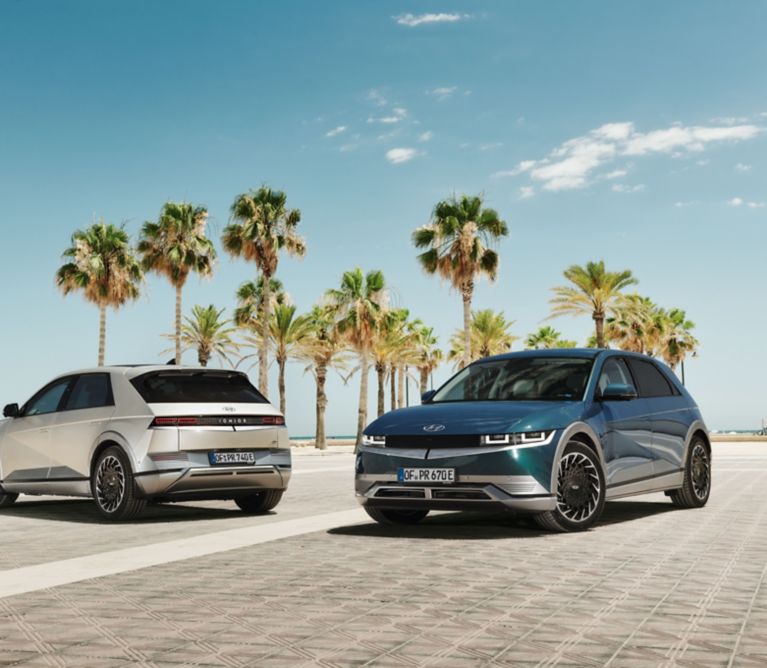- Hyundai Motor celebrates a strong recovery in first three quarters of 2021
- Company gained a market share of 0.6 percentage points across first nine months of year
- Number of new car registrations rose by 24.2 per cent in same period
Press material
-
Download
Hyundai Motor has recorded a significant recovery in Europe in the first nine months of 2021, according to the latest data from the European Automobile Manufacturers Association (ACEA). The automaker’s year-to-date market share rose to 4.2 per cent, up 0.6 percentage points from 2020 in EU, EFTA and UK.
During this period, the company sold 383,429 units across the continent. This corresponds to an increase of 24.2 per cent compared to January-September 2020, outperforming the overall market trend.
Additionally, the number of Hyundai cars produced in Europe rose to 75 per cent of the company’s overall sales. The main sales drivers included TUCSON, i20 and KONA. Other popular models include the company’s future mobility line-up, such as IONIQ 5, which celebrated its world premiere in February.
Hyundai was able to overcome the challenging start to the year. Our supply chain management made it possible for us to gain momentum also throughout the recent months. Thanks to our progressive electrified line-up spearheaded by IONIQ 5, we are outperforming the market trend. With our broad fleet that includes BEVs, FCEVs and hybrid models, Hyundai offers a full range of electrified powertrains that no other manufacturer can offer.
Qualitative growth drives Hyundai’s success
Another key contributor to Hyundai’s success has been the brand’s multiple new product launches in recent years. The company now boasts one of the youngest line-ups in the industry.
In coming years, Hyundai intends to establish itself as one of the top three producers of BEVs globally. With this continued investment in electric vehicles and focus on qualitative growth, the company expects to sustain its position as a leader in future mobility.
About ACEA
The European Automobile Manufacturers’ Association (ACEA) represents the 15 major Europe-based car, van, truck and bus makers. ACEA works with a variety of institutional, non-governmental, research and civil society partners, as well as a number of industry associations with related interests.
Disclaimer: CO2 and emissions data
- Fuel consumption combined for the Hyundai TUCSON 1.6 T-GDI 48V (150 PS) with 6iMT 2WD in l/100 km: 6.8 - 6.5; CO2 emissions combined in g/km: 154 - 147 (WLTP)
- Fuel consumption combined for the Hyundai TUCSON 1.6 T-GDI 48V (150 PS) with 7DCT 2WD in l/100 km: 6.6 - 6.3; CO2 emissions combined in g/km: 150 - 143 (WLTP)
- Fuel consumption combined for the Hyundai TUCSON 1.6 T-GDI 48V (180 PS) with 6iMT 2WD in l/100 km: 6.7 - 6.4; CO2 emissions combined in g/km: 152 - 145 (WLTP)
- Fuel consumption combined for the Hyundai TUCSON 1.6 T-GDI 48V (180 PS) with 7DCT 4WD in l/100 km: 7.1 - 6.9; CO2 emissions combined in g/km: 162 - 156 (WLTP)
- Fuel consumption combined for the Hyundai TUCSON 1.6 CRDi 48V (136 PS) with 6iMT 2WD in l/100 km: 5.3 - 5.0; CO2 emissions combined in g/km: 140 - 130 (WLTP)
- Fuel consumption combined for the Hyundai TUCSON 1.6 CRDi 48V (136 PS) with 7DCT 2WD in l/100 km: 5.6 - 5.2; CO2 emissions combined in g/km: 146 - 137 (WLTP)
- Fuel consumption combined for the Hyundai TUCSON 1.6 CRDi 48V (136 PS) with 7DCT 4WD in l/100 km: 6.0 - 5.7; CO2 emissions combined in g/km: 158 - 149 (WLTP)
- Fuel consumption combined for the Hyundai TUCSON 1.6 T-GDI (150 PS) with 6MT 2WD in l/100 km: 7.0 - 6.6; CO2 emissions combined in g/km: 159 - 150 (WLTP)
- Fuel consumption combined for the Hyundai TUCSON 1.6 T-GDI (150 PS) with 6MT 4WD in l/100 km: 7.8 - 7.3; CO2 emissions combined in g/km: 178 - 165 (WLTP)
- Fuel consumption combined for the Hyundai TUCSON 1.6 CRDi (115 PS) with 6MT 2WD in l/100 km: 5.6 - 5.2; CO2 emissions combined in g/km: 146 - 137 (WLTP)
- Fuel consumption combined for the Hyundai TUCSON 1.6 T-GDI Hybrid with 6AT 2WD in l/100 km: 5.9 - 5.5; CO2 emissions combined in g/km: 135 - 125 (WLTP)
- Fuel consumption combined for the Hyundai TUCSON 1.6 T-GDI Hybrid with 6AT 4WD in l/100 km: 6.6 - 6.2; CO2 emissions combined in g/km: 149 - 140 (WLTP)
- Fuel consumption combined for the Hyundai TUCSON 1.6 T-GDI Plug-in Hybrid with 6AT 4WD in l/100 km: 1.4; CO2 emissions combined in g/km: 31 (WLTP)
- Fuel consumption combined for the Hyundai i20 1.2 MPi (84 PS) with 5MT in l/100 km: 5.7 - 5.4; CO2 emissions combined in g/km: 129 - 124 (WLTP)
- Fuel consumption combined for the Hyundai i20 1.0 T-GDI (100 PS) with 6MT in l/100 km: 5.5 - 5.1; CO2 emissions combined in g/km: 127 - 117 (WLTP)
- Fuel consumption combined for the Hyundai i20 1.0 T-GDI (100 PS) with 7DCT in l/100 km: 5.8 - 5.3; CO2 emissions combined in g/km: 131 - 120 (WLTP)
- Fuel consumption combined for the Hyundai i20 1.0 T-GDI 48V (100 PS) with 6iMT in l/100 km: 5.4 - 4.9; CO2 emissions combined in g/km: 123 - 113 (WLTP)
- Fuel consumption combined for the Hyundai i20 1.0 T-GDI 48V (100 PS) with 7DCT in l/100 km: 5.6 - 5.1; CO2 emissions combined in g/km: 128 - 115 (WLTP)
- Fuel consumption combined for the Hyundai i20 1.0 T-GDI 48V (120 PS) with 6iMT in l/100 km: 5.4 - 5.0; CO2 emissions combined in g/km: 124 - 115 (WLTP)
- Fuel consumption combined for the Hyundai i20 1.0 T-GDI 48V (120 PS) with 7DCT in l/100 km: 5.4 - 5.1; CO2 emissions combined in g/km: 124 - 116 (WLTP)
- Fuel consumption combined for the Hyundai i20 Kappa 1.4 with 6MT in l/100 km: 6.5 - 6.2; CO2 emissions combined in g/km: 148 - 142 (WLTP)
- Fuel consumption combined for the Hyundai i20 Kappa 1.4 with 6AT in l/100 km: 7.1 - 6.5; CO2 emissions combined in g/km: 162 - 147 (WLTP)
- Fuel consumption combined for the Hyundai KONA 1.0 T-GDI with 6MT 2WD in l/100 km: 6.1 - 5.7; CO2 emissions combined in g/km: 137 - 128 (WLTP)
- Fuel consumption combined for the Hyundai KONA 1.0 T-GDI with 7DCT 4WD in l/100 km: 6.0 - 5.8; CO2 emissions combined in g/km: 137 - 132 (WLTP)
- Fuel consumption combined for the Hyundai KONA 1.0 T-GDI 48V with 6iMT 2WD in l/100 km: 6.1 - 5.5; CO2 emissions combined in g/km: 139 - 124 (WLTP)
- Fuel consumption combined for the Hyundai KONA 1.6 T-GDI with 7DCT 2WD in l/100 km: 6.7 - 6.2; CO2 emissions combined in g/km: 152 - 142 (WLTP)
- Fuel consumption combined for the Hyundai KONA 1.6 T-GDI with 7DCT 4WD in l/100 km: 7.4 - 7.0; CO2 emissions combined in g/km: 167 - 160 (WLTP)
- Fuel consumption combined for the Hyundai KONA 1.6 CRDi with 6iMT 2WD in l/100 km: 5.2 - 4.7; CO2 emissions combined in g/km: 136 - 124 (WLTP)
- Fuel consumption combined for the Hyundai KONA 1.6 CRDi with 7DCT 2WD in l/100 km: 5.2 - 4.7; CO2 emissions combined in g/km: 136 - 124 (WLTP)
- Fuel consumption combined for the Hyundai KONA 1.6 CRDi with 7DCT 4WD in l/100 km: 5.6 - 5.2; CO2 emissions combined in g/km: 147 - 137 (WLTP)
- Fuel consumption combined for the Hyundai KONA Hybrid 1.6 GDI Hybrid in l/100 km: 5.4 - 5.0; CO2 emissions combined in g/km: 122 - 114 (WLTP)
- Electricity consumption combined for the Hyundai KONA Electric 39.2 kWh in kWh/100 km: 14.3; CO2 emissions combined in g/km: 0 (WLTP)
- Electricity consumption combined for the Hyundai KONA Electric 64 kWh in kWh/100 km: 14.7; CO2 emissions combined in g/km: 0 (WLTP)
- Fuel consumption combined for the Hyundai KONA N 2.0 T-GDI (280 PS) with DCT in l/100 km: 8.5; CO2 emissions combined in g/km: 194 (WLTP)
- Electricity consumption combined for the Hyundai IONIQ 5 58 kWh with 2WD in kWh/100 km: 16.7; CO2 emissions combined in g/km: 0 (WLTP)
- Electricity consumption combined for the Hyundai IONIQ 5 58 kWh with 4WD in kWh/100 km: 18.1; CO2 emissions combined in g/km: 0 (WLTP)
- Electricity consumption combined for the Hyundai IONIQ 5 72.6 kWh (19” alloy rims) with 2WD in kWh/100 km: 16.8; CO2 emissions combined in g/km: 0 (WLTP)
- Electricity consumption combined for the Hyundai IONIQ 5 72.6 kWh (20” alloy rims) with 2WD in kWh/100 km: 17.9; CO2 emissions combined in g/km: 0 (WLTP)
- Electricity consumption combined for the Hyundai IONIQ 5 72.6 kWh (19” alloy rims) with 4WD in kWh/100 km: 17.7; CO2 emissions combined in g/km: 0 (WLTP)
- Electricity consumption combined for the Hyundai IONIQ 5 72.6 kWh (20” alloy rims) with 4WD in kWh/100 km: 19.0; CO2 emissions combined in g/km: 0 (WLTP)









